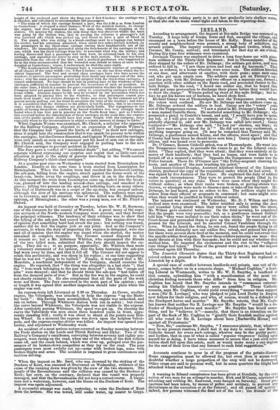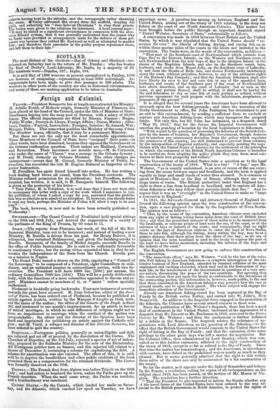IRELAND.
According to arrangement, the inquest at Six-mile Bridge was resumed on Tuesday. A large body of troops, horse and foot, occupied the village, and encamped on a lawn before the house of Mr. Kelly. Many notables of the county and neighbourhood were present, a strong body of solicitors, and several priests. The inquiry commenced at half-past twelve, when the Coroner, Mr. Canny, arrived ; and terminated for that day at six o'clock. During this time four witnesses were examined.
Jeremiah Tierney was employed to drive a long four-horse car with nine. teen soldiers of the Thirty-first Regiment ; first to Thomondgate. There they stopped by the orders of Mr. Delmege ; the soldiers got down, and were ordered to fall in. " I saw them prime and load and fix bayonets." They went, as ordered, to a house wherein were some men. The soldiers knocked at one door, and afterwards at another, with their guns ; some men came out, who got upon empty ears. The soldiers again got on Tierney's car; and the party, with Mr. Delmege and two officers on a separate car, formed a junction with other soldiers on the Ennis road, and proceeded thence to Six. mile Bridge. On the mad, " I heard one soldier say, that he hoped they would get some provocation to discharge their pieces before they would bare to draw the charge." Witness pulled up short of Six-mile Bridge ; but be- fore he got his horses out of harness, he heard shots fired. Michael Canny was at Thomondgate, near the Temperance rooms, where the voters were confined. He saw Mr. Delmege and the soldiers come up, Mr. Delmege ordered the soldiers to load. Canny saw the " voters " come out of the Temperance rooms. " I saw a pistol in Mr. Delmege's hand. I saw a man named Costello there. He muttered something to Mr. Delmege ; who presented a pistol to Costello's breast, and said, I would have you be quiet, my lad, or I will give you the contents of this.' " [The evidence was re- peatedly objected to, and now Mr. Delmege was called into court.] Canny continued—" Mr. Delmege also said, Ye had yer ' election, my boys; we will have ours now, or blood for it.' " He did not see any excitement, or anything improper going on. [It may be remarked that Tierney said Mr. Delmege, a gentleman named Keane, and the officers' stood apart ; and that if Canny had been there he should have seen him.] Canny signed his depo- sitions, and was bound over to prosecute.
Dr. O'Connor, Roman Catholic priest, was at Thomondgate. He went into the Temperance Moms, to persuade the voters to go for the Liberal candi- dates. "They replied, that they were afraid ; that they were entirely at the mercy of their landlords; that they had no leases, and were liable to be turned off at a moment's notice." Opposite the Temperance rooms was the Police barrack. There Dr. O'Connor saw " the Police-sergeant cleaning his boots, and another of the men brushing his jacket."
Lieutenant-Colonel Douglas, Assistant Adjutant-General of the Limerick district, produced the copy of the requisition under which he had acted. It was signed by five Justices of the Peace. He explained the duty of soldiers under such circumstances. They were to protect the people that is, the voters in question] at any risks. There were cases when they might fire without orders ; as when their ranks were broken, or paving-stones were thrown, 'or attempts were made to disarm a man or take off his bayonet. Mr. Delmege, he had heard, gave no orders to fire. The soldiers ought to take orders from their officers or sergeants in command ; but cases might arise when they would be justified in firing without orders. The inquest was continued on Wednesday. Mr. B. J. Wilson and three medical men were examined: The latter testified only to seeing the dead and wounded lying About when they ran or were called into the street. Mr. Wilson gave material testimony. On the fatal morning, he considered that the people were very peaceable,' but, as a gentleman named Gabbett told him "they were inclined to use their oaken sticks," he went out of the Court-house and persuaded them to give up the sticks. He rescued a voter pressed for the Liberals, and he escorted Colonel Vandeleur through the town. When he heard the firing, he ran out, found the people flying in all directions, and distinctly saw one soldier fire, reload, and present his piece; but there were several shots fired at the moment., and he could not swear that the specific soldier fired again. He saw three soldiers pursuing one man : they made thrusts at him with their bayonets; but he could not say whether they stabbed him. He imputed the excitement and the riot to the "religious turn things had taken." Plans of the ground were put in ; and the inquest adjourned again till Thursday.
The Limerick Chronicle states that the,Thirty-first Regiment had re- ceived orders to proceed to Fermoy, and that it would be replaced at Limerick by a de-pert.
A special case of conflict between landlords and priests, one out of the many, conies before us in a concrete shape. "Michael Coghlan," lead- ing Liberal in Westmeath, writes to Mr. W. B. Smythe, a landlord of that county, upbraiding him " with a manifestation of the most un- christian feeling towards those who differ" from him in religion. Mr. Coghlan has heard that Mr. Smythe intends to " commence extermi- nating his Catholic tenantry as soon as possible." These Catholic tenants, says Mr. Coghlan, would yield everything "sooner than support a man [Sir R. Levinge] who was pledged to join Lord Derby in forging new fetters for their religion, and who, of course, would be a defender of the Stockport havoc and murder." Mr. Smythe retorts, that Mr. Cogh- lan knows that neither Sir R. Levinge nor Mr. Smythe " would be a de- fender of Stockport havoc and murder." Mr. Smythe has heard some- thing, and he " believes it"—namely, that there is an intention on the part of the flock of Mr. Coghlan to "gratify their fiendish malice against all who voted for Sir R. Levinge about here [Barbavilla House] and against all Protestants."
" Now, Sir," continues Mr. Smythe, " I announce plainly, that, whatever may be my present resolves, I shall feel it my duty to remove one Roman Catholic tenant for every such outrage, whoever may be the guilty party; and further, that in case of what is called popular vengeance' falling upon myself for so doing, I have taken measures to secure that a just civil retri- bution shall fall upon this estate, such as' would make many a one deplore for the rest of their lives that any listened to such fatal suggestions."
Accounts continue to pour in of the progress of the potato-disease. Some exaggeration must be allowed for, but even then it seems very doubtful whether a large proportion of the crop will not be destroyed. Other crops are said to promise well, but in some quarters the blight had attacked wheat and barley.
A warning to Riband conspirators has been given at Dundalk, by the exe- cution of two men for an attempt to murder. Kirk and M'Cooey, convicted of attacking and robbing Mr. Eastwood, were hanged on Saturday. Great pre- cautions had been taken, by means of police and military, to prevent any disturbance at the execution or at the funeral ; and all passed off quietly : indeed, few persons witnessed the final act of the law ; the friends of the n having kept in the suburbs, and the townspeople rather shunning the Beene. M'Cooey addressed the crowd from the scaffold, denying his • t, and exhorting his "dear-beloved Christians" to obey their priests. the bodies were given to the relations for interment. A local journal says— "It may be stated as a significant circumstance in connexion with the atro- cious Riband system, that it was generally understood that the reason why no funds were provided or arrangements made for the defence of these pri- soners was because they robbed Mr. Eastwood as well as attempted to murder bins ; and therefore their associates in the guilty purpose repudiated them, and left them to their fate."



























 Previous page
Previous page